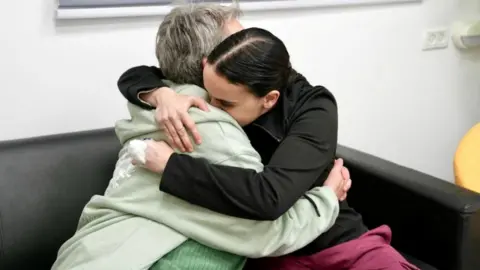Emily Damari, a British-Israeli woman who endured a harrowing experience as a hostage of Hamas for over 15 months, has voiced her profound concerns regarding Labour Party leader Sir Keir Starmer’s recent announcement to recognize a Palestinian state. Damari’s direct criticism revolves around the notion that Starmer’s pledge risks legitimizing acts of terror. She stated that with this stance, he is “not standing on the right side of history,” raising historical parallels to previous conflicts where aggression was met with state recognition.
Starmer’s commitment entailed recognizing a Palestinian state in September unless Israel adhered to certain critical conditions, such as establishing a ceasefire and rekindling the two-state solution dialogue. In contrast, Israeli Prime Minister Benjamin Netanyahu condemned this move, arguing it would reward “Hamas’s monstrous terrorism.” This diverging perspective between UK politics and Israeli leadership highlights the tension surrounding a complex international issue.
Damari’s plight began when she was forcibly taken from her home in Kibbutz Kfar Aza on October 7, 2023, where she was shot and incapacitated during the attack that also resulted in the tragic demise of her beloved dog. In her statements following release, she has not only championed her struggle for her fellow captives, including her friends Ziv and Gali Berman but also articulated her fears over what this political gesture might imply for their fate and the ongoing violence in the region.
In a furious social media post, she criticized Prime Minister Starmer’s approach, likening it to recognizing Nazi-controlled territories during World War II, thereby questioning the moral compass guiding such decisions. She asserted that welcoming such recognition while Hamas remains active would do nothing but embolden extremists and disregard the plight of hostages, thereby contradicting the very essence of striving for peace. This sentiment reverberates among families of hostages who are pleading for assurances that their loved ones’ release would not be jeopardized by political maneuvers.
The family representatives of British hostages expressed their unease regarding the UK’s proposal, warning it could inadvertently incentivize Hamas to maintain its grip on hostages, anticipating that negotiations or recognition might come only with delays in hostage releases. They implored the government to clarify its stance, ensuring that no recognition would occur until all hostages were freed, fearing that such a political gesture might encourage further hostage-taking.
In light of the escalating humanitarian crisis in Gaza, where dire conditions have led UN experts to warn of a famine, the UK’s stance reflects a broader international concern for civilian suffering. Sir Keir Starmer addressed these urgent issues during an emergency cabinet meeting, contextualizing his announcement as a necessary response to the “intolerable situation” in Gaza, a region where the potential for a two-state solution appears increasingly tenuous. While his primary aim was to alleviate these conditions, he stressed that Hamas must also take significant steps towards disarmament and cooperation.
Speaking from his perspective on the hostage situation, Steve Brisley, whose own family members were victims of the October attacks, reiterated the need for a clear message—no recognition until hostages are freed. He shared apprehensions that such actions could further extend the suffering of those still captive by implying a conditional timeline on Israel without a reciprocal obligation on Hamas.
The Israeli government has faced immense scrutiny over its handling of aid to Gaza, having imposed a blockade and subsequently resumed military operations. The situation remains increasingly precarious, with reports indicating widespread shortages of essential supplies and a humanitarian breakdown exacerbating an already dire environment.
Foreign Secretary David Lammy emphasized the global responsibility to address the humanitarian crisis while calling attention to the atrocities witnessed in Gaza. He conveyed hope that the UK’s recent diplomatic positioning might facilitate a cessation of hostilities and aid the release of hostages—actions that underline the challenging intersection of ethics, politics, and human rights in one of the world’s most enduring conflicts.
Ultimately, the developments surrounding the UK’s approach to recognizing Palestine amidst ongoing hostilities and the delicate balance of contingent humanitarian concerns epitomize the complexities entailed in navigating geopolitics and moral accountability in a deeply fractured region.












